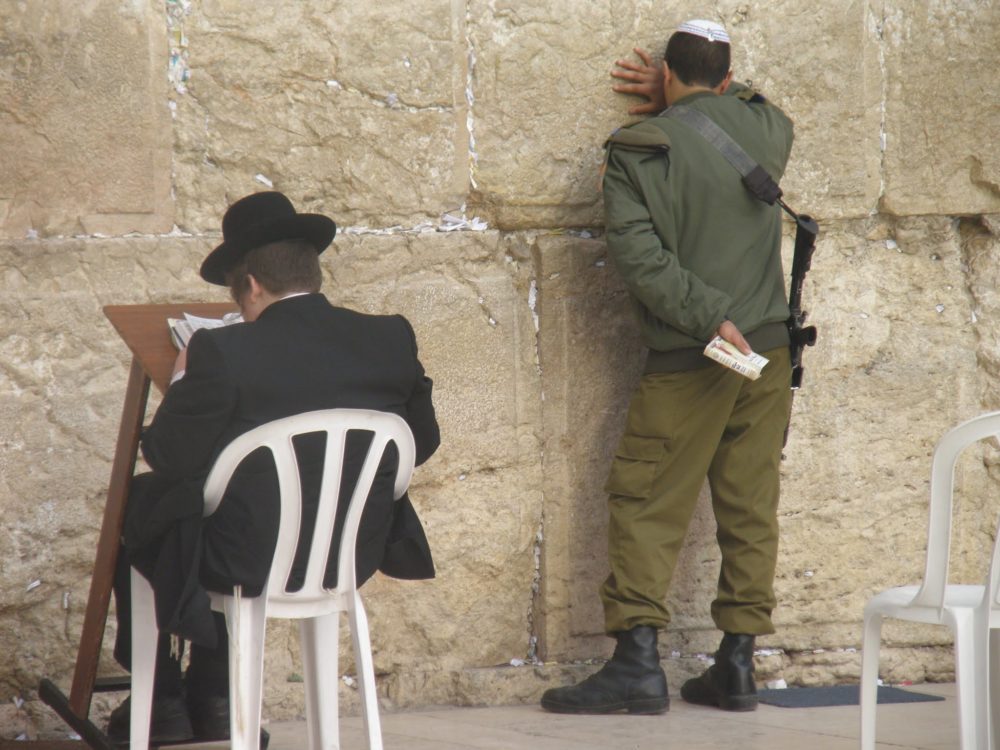
In 2012 Elise and I went to Israel with a tour group from the synagogue we attend. It was an amazing trip and one I would highly recommend you go on if at all possible. While we did get to the Church of the Holy Sepulchre, we saw the country from mostly a Jewish perspective. Visiting sites most related to Jewish history such as Masada (the mountain top where Jewish rebels were surrounded and starved by the Romans) and places associated with Israel’s fight for independence.
One of the more memorable locations was the Western Wall. The wall is a remnant of the second temple in Jerusalem. It also surrounds the Dome of the Rock, an important Islamic shrine. The wall is also called the Wailing Wall because Jews are often seen standing at the wall in mourning vigil and prayer. The picture at the top of this reflection was taken by me during this trip. I was struck by the juxtaposition of prayer by two very different individuals…an Israeli soldier and Orthodox Rabbi. And likely two very different forms of prayer. The structured rabbinic variety and the spontaneous prayer of the soldier.
Another time honored tradition at the wall is to write a short prayer on a piece of paper and stuff it into one of the many cracks in the wall itself. And as I was looking at the readings from today, especially the Gospel, I thought about that little slip of paper I left there almost 8 years ago. I can say three things I know for sure about the outcome of that prayer. 1) I did not see my request come to fruition in a blinding light or sudden upheaval in my life, 2) I am seeing the answer to that prayer unfolding continuously since that time and 3) I have not stopped reciting it since that day in Jerusalem.
So do we “wear down” God with our prayers until he finally gives in to our whining? Is that what the widow did to get a just verdict from the dishonest judge? Does God fear getting a “black eye” from us as did the judge, if he does not answer our prayers the way we want? I just cannot believe that our persistent prayer changes God into giving us something WE want just because we ask persistently. Would God grant us something that in the end is bad for us just because we beg him for it? Prayers do go unanswered. We may ask for things, even repeatedly, that do not come to us in the way that we wanted. Even Jesus prayed in the garden that the cup of his passion pass him by. He prayed so hard that blood fell like droplets of sweat. But, in the end, he had to endure the sufferings in order to achieve the triumph of His resurrection.
As Catholics we see prayer in many different forms. Prayer of Adoration of God, prayer of contrition where we ask for forgiveness, prayer of petition asking for something for ourselves and others, and prayer of Thanksgiving. Even participating in mass is a form of prayer in that we ask for forgiveness in the penitential rite, for petition in the prayers of the faithful, adoration in the Gloria and Holy, Holy, Holy. And Thanksgiving in that the word, Eucharist, itself means Thanksgiving.
But what is the thread of commonality of all these types of prayer? It is communication. How do we stay in touch with a close friend without regular communication with them. We call or write and we visit. And this is why we pray. It is not about begging God or pestering him to get what we want. It is about wanting to know HIS will for us. Prayer is meant to bring us closer to understanding what God has in store for us. To merge our will with His. Christ showed us who the Father is and also showed us how to pray. At every step where He had a decision to make, he spent time in prayer with the Father. Then He took some quiet time to LISTEN for the answer.
At the end of the parable, Jesus asks his apostles, “When the Son of Man comes, will he find faith on earth?” And we must have the faith to trust that an answer to our prayers will come in God’s time. That may be immediate or it may take years. Like the widow, we need to keep an open dialogue with God and allow him to shape us in His image for us. As the Catholic writer, Matthew Kelly, often says, “To become the best version of ourselves”.
The widow kept pestering the judge, the man kept knocking at the neighbor’s door asking for bread, and the virgins kept their lamps lit waiting for the bridegroom to return. And so must we keep asking and listening so that when the day arrives, like a thief in the night, God will not say “I do not know you”.

